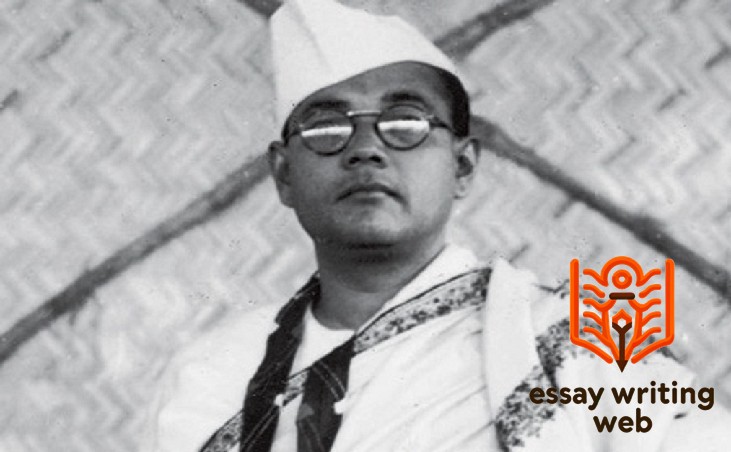 Essay Writing Web
Essay Writing Web
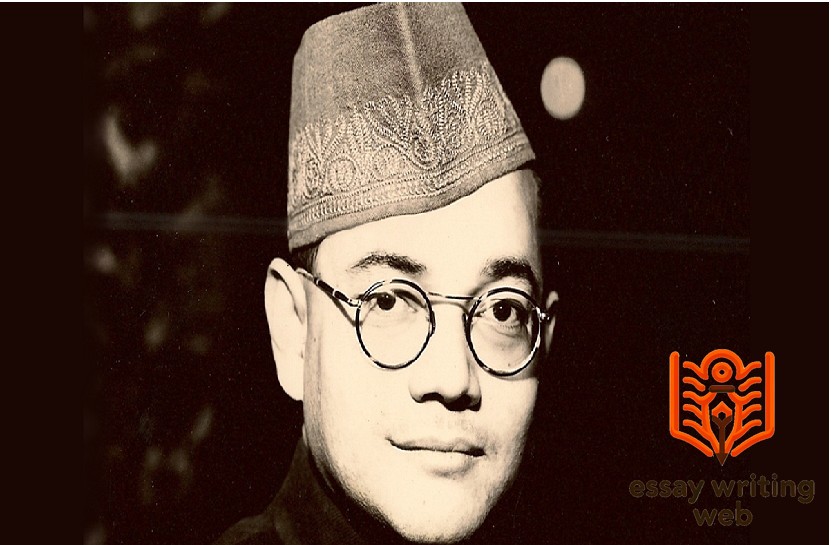
 03-09-2024
03-09-2024
 www.essaywritingweb.com
www.essaywritingweb.com
Netaji Subhash Chandra Bose stands as one of the most enigmatic and influential figures in India’s struggle for independence. Born on January 23, 1897, in Cuttack, Odisha, Bose’s life was marked by an intense dedication to the cause of Indian freedom, a commitment that would lead him to adopt unorthodox methods and revolutionary ideas. Unlike many of his contemporaries who advocated for non-violent resistance against British rule, Bose believed in the necessity of armed struggle. His ideology and methods often put him at odds with the mainstream leadership of the Indian National Congress, particularly Mahatma Gandhi, yet his impact on the freedom movement is undeniable.
Bose's vision for India was deeply rooted in a desire for swift and decisive action against colonial oppression. His conviction led him to form the Forward Bloc and later the Indian National Army (INA), which sought to overthrow British rule through military means. Bose’s charismatic leadership and powerful oratory inspired countless Indians to join the freedom struggle, viewing him as a beacon of hope and a symbol of defiance against the British Empire.
Netaji’s approach to the independence movement was marked by a unique blend of nationalism and socialism. He envisioned a free India where economic and social justice prevailed, and where the country could stand strong and independent on the global stage. His alliance with Axis powers during World War II, while controversial, underscored his relentless pursuit of India’s freedom by any means necessary.
Though his life was tragically cut short under mysterious circumstances, the legacy of Netaji Subhash Chandra Bose continues to resonate in modern India. He remains an enduring symbol of patriotism, courage, and the relentless pursuit of justice, reminding future generations of the sacrifices made in the quest for independence. His contributions to India’s freedom struggle are an integral part of the nation's history, making him a revered figure whose impact is felt to this day.
Netaji Subhash Chandra Bose, one of India's most revered freedom fighters, was born on January 23, 1897, in Cuttack, a city in present-day Odisha. He hailed from a prominent Bengali family, known for its intellectual and cultural contributions to society. His father, Janakinath Bose, was a well-respected lawyer and held the prestigious title of "Rai Bahadur," an honor bestowed upon him by the British government for his service. Despite his initial cooperation with the British authorities, Janakinath Bose instilled in his children a strong sense of national pride and an awareness of the social and political conditions of India under British rule.
Subhash Chandra Bose's mother, Prabhavati Devi, was a devout and religious woman who played a significant role in shaping his character and values. She was known for her deep spirituality and her adherence to traditional Indian values, which greatly influenced young Subhash. Growing up in a large family with eight siblings, Bose was exposed to diverse ideas and discussions, fostering his intellectual curiosity from a young age.
The Bose family was deeply rooted in the cultural and educational milieu of Bengal, a region that was a hub of intellectual and nationalist activities during the late 19th and early 20th centuries. This environment played a crucial role in shaping Subhash's worldview and his eventual commitment to the cause of India's independence. The values of discipline, courage, and self-respect that he inherited from his parents would later become the cornerstones of his leadership in the freedom struggle.
Subhash Chandra Bose's early life in Cuttack was marked by a deep sense of responsibility towards his family and his country. The strong moral and ethical foundation laid by his parents, coupled with the intellectual environment of his upbringing, set the stage for his future role as a leader of India's independence movement. His birth and family background were not just the beginning of his life story but also the roots from which his fierce determination and patriotism grew, eventually making him a legendary figure in India's history.
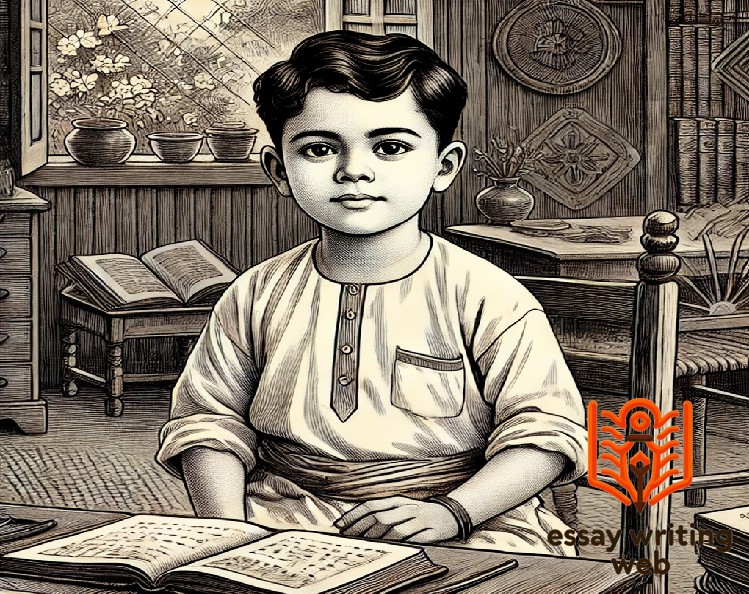
Netaji Subhash Chandra Bose's education and early influences played a pivotal role in shaping his revolutionary spirit and commitment to India's independence. Born into a prominent Bengali family in 1897, Bose's academic journey began in his hometown of Cuttack, where he attended the Protestant European School. From an early age, Bose displayed an exceptional intellect and a keen interest in both his studies and the broader social and political issues of the time.
In 1909, Bose was sent to the prestigious Ravenshaw Collegiate School, where he further honed his academic skills. He was deeply influenced by his headmaster, Beni Madhab Das, a man known for his nationalist ideals and commitment to social reform. Under Das’s guidance, Bose developed a profound sense of duty toward his country, coupled with a growing discontent with British rule. His exposure to the works of Swami Vivekananda and the teachings of his mother, Prabhavati Devi, also left a lasting impact on his mind, instilling in him a strong a deep sense of spirituality and moral compass.
After completing his schooling in Cuttack, Bose moved to Calcutta (now Kolkata) in 1913 to attend Presidency College, one of the most esteemed institutions in British India. It was here that Bose’s nationalist fervor truly began to take shape. The political environment at Presidency College was charged with the spirit of resistance against British colonialism, and Bose was quick to immerse himself in it. However, his activism came at a cost. After leading a protest against the anti-Indian sentiments of a professor, Bose was expelled from the college, an event that only fueled his resolve to fight for his country’s freedom.
Undeterred by this setback, Bose enrolled at the Scottish Church College in Calcutta, where he completed his Bachelor’s degree in Philosophy. His academic excellence earned him a place at the University of Cambridge in England, where he pursued higher studies. In 1919, Bose traveled to England with the intention of preparing for the Indian Civil Services (ICS) examination, a coveted position that many saws as a means to influence the British administration from within.
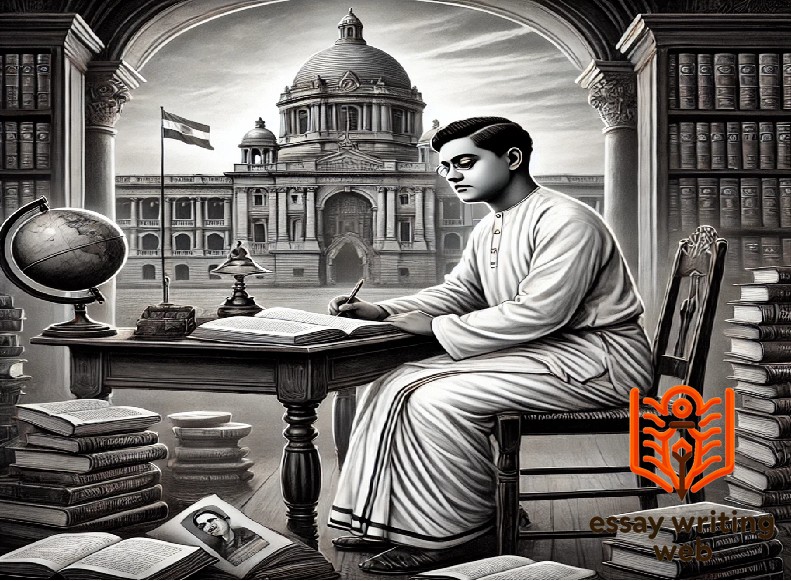
Netaji Subhash Chandra Bose's political awakening was a crucial phase in his life, marking the transition from a brilliant student to one of India's most dynamic and revolutionary leaders. This period was characterized by his growing disillusionment with British colonial rule and his realization that the struggle for India’s independence would require more radical approaches than those being pursued by the mainstream political leadership of the time.
After resigning from the Indian Civil Services (ICS) in 1921, Bose returned to India with a fervent desire to contribute to the freedom struggle. His resignation from the ICS was not just a personal decision but a profound political statement, symbolizing his rejection of serving the British administration. Upon his return, Bose was drawn to the Indian National Congress (INC), the primary political organization leading the fight for independence. Under the leadership of Mahatma Gandhi, the Congress was advocating non-violent civil disobedience as the principal means of resisting British rule.
However, Bose soon found himself at odds with the Congress's leadership, particularly Gandhi’s emphasis on non-violence. While he respected Gandhi's dedication and the mass appeal of his methods, Bose believed that complete independence, or Purna Swaraj, could not be achieved solely through non-violent means. He was convinced that the British would not relinquish control of India unless they were met with a more forceful resistance. This belief set the stage for his political awakening and the development of his own revolutionary ideology.
Bose’s political views were heavily influenced by his exposure to global events and political thinkers. During his time in Europe, he was inspired by the success of revolutionary movements and was deeply influenced by socialist and fascist ideologies, particularly the emphasis on strong central leadership and the mobilization of the masses for national causes. His admiration for leaders like Giuseppe Garibaldi, the Italian revolutionary, and his interactions with European socialists further shaped his belief that India needed a strong and organized movement to overthrow British rule.
In the 1920s, Bose began to rise within the ranks of the Congress. His charisma, oratory skills, and organizational abilities made him a popular figure, particularly among the youth. He was elected as the president of the All-India Youth Congress and later served as the Mayor of Calcutta (now Kolkata) in 1930. Bose's leadership style was marked by a sense of urgency and a desire for action, traits that endeared him to a younger generation of Indians who were becoming increasingly impatient with the slow pace of the non-violent struggle.
Bose's political awakening reached its peak in 1938 when he was elected President of Indian National Congress. His presidency was marked by a clear divergence from the moderate policies of the Congress leadership. Bose advocated for the immediate and complete independence of India, and he sought to strengthen the Indian National Army (INA) to achieve this goal. His tenure as Congress President, however, was short-lived due to ideological differences with Gandhi and other senior leaders. These differences culminated in his resignation from the presidency in 1939, after which he formed the Forward Bloc, a faction within the Congress aimed at consolidating the left-wing forces within the party.
Bose's political awakening was not just a personal journey but a reflection of the broader shifts within the Indian freedom movement. His belief in the necessity of armed struggle, his admiration for authoritarian leadership models, and his commitment to socialism set him apart from his contemporaries and laid the groundwork for his later actions, including the formation of the INA. Netaji Subhash Chandra Bose's political awakening was a defining moment in his life, one that would lead him to become one of the most radical and influential leaders in India's fight for independence.
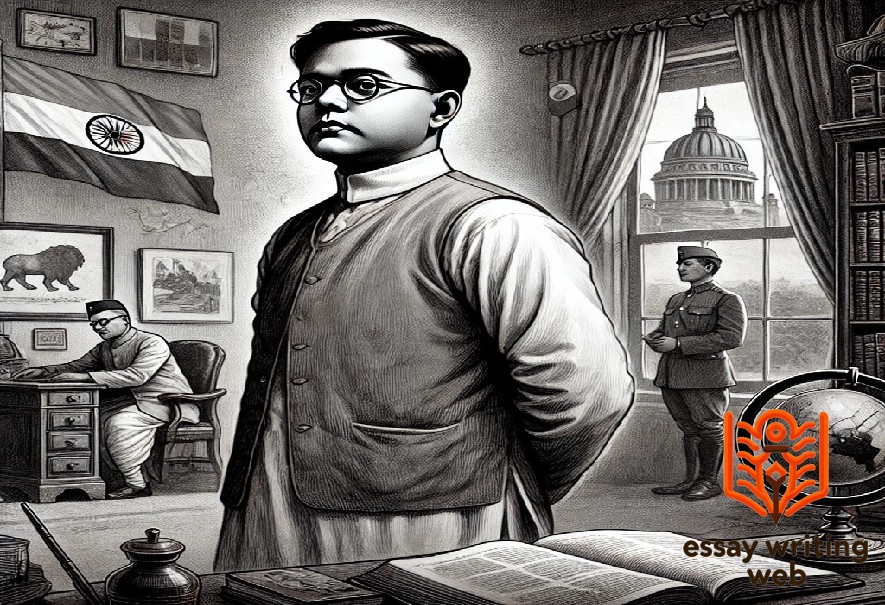
Netaji Subhash Chandra Bose was a visionary leader whose ideology and vision for India’s independence set him apart from many of his contemporaries in the freedom struggle. His approach to securing India’s liberation from British rule was marked by a blend of radicalism, pragmatism, and an unwavering commitment to the idea of a free and united India. Bose’s vision for India was not only about political independence but also about creating a nation that was economically self-reliant, socially just, and militarily strong.
Bose’s ideology was shaped by his exposure to various global political movements and his deep dissatisfaction with the moderate approach of the Indian National Congress. Unlike many leaders who advocated for gradual reforms and non-violent resistance, Bose believed that only a determined and forceful struggle could overthrow the British colonial power. His time in Europe, where he interacted with leaders of various revolutionary movements and studied different political ideologies, further solidified his belief in the need for a more assertive and militant approach to India’s freedom struggle.
Central to Bose’s ideology was the concept of Purna Swaraj, or complete independence. He rejected the idea of dominion status or any form of compromise with the British, insisting that nothing short of full sovereignty was acceptable for India. This uncompromising stance made him a symbol of defiance and a rallying point for those who were frustrated with the slow pace of the non-violent movement led by Mahatma Gandhi. Bose’s belief in direct action led him to advocate for the use of military force as a legitimate means to achieve independence, a stance that ultimately led to the formation of the Indian National Army (INA).
Bose’s vision for India extended beyond mere political independence. He envisioned a nation that was economically self-sufficient, socially equitable, and militarily capable of defending its sovereignty. He was deeply influenced by socialist ideals and believed in the need for a strong central government that could direct the nation’s resources towards industrialization and economic development. Bose’s economic vision for India included state control over key industries, land reforms to address the agrarian crisis, and the promotion of education and scientific research to drive national progress.
In the social sphere, Bose was a staunch advocate for equality and justice. He was acutely aware of the deep-seated social divisions in India, particularly those based on caste, religion, and gender. Bose’s vision for India included the eradication of these divisions and the creation of a society where all citizens, regardless of their background, had equal opportunities to prosper. He supported the upliftment of marginalized communities and was particularly vocal about women’s rights, advocating for their active participation in the freedom struggle and in the nation-building process.
Bose’s military vision was perhaps the most radical aspect of his ideology. He believed that India needed a strong and disciplined military force to not only secure its independence but also to protect it from external threats in the future. This belief led to his efforts in building the INA, which sought to achieve independence through armed struggle. Bose’s alliance with Axis powers during World War II, although controversial, was driven by his strategic calculation that these powers could help weaken British control over India.
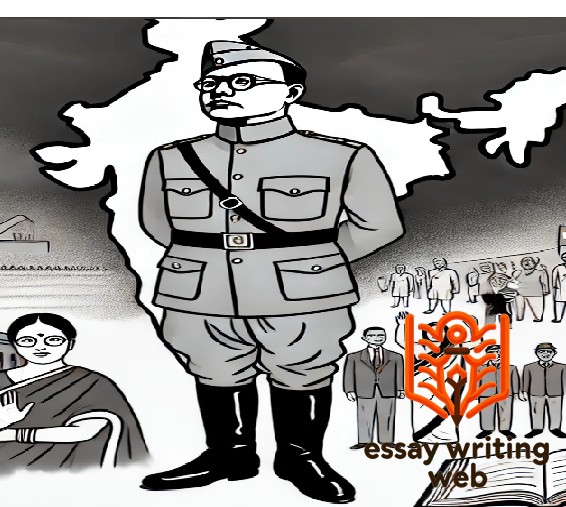
Netaji Subhash Chandra Bose was one of the most charismatic and influential leaders in the Indian freedom struggle. While several freedom fighters advocated peaceful, non-violent methods, Bose believed that India’s independence could only be achieved through armed revolution. His belief led him to play a pivotal role in the formation of the Indian National Army (INA), an armed force aimed at liberating India from British colonial rule.
Born in 1897 in Cuttack, Odisha, Bose was deeply influenced by the idea of self-reliance and nationalism from a young age. After being exposed to the works of Swami Vivekananda and other nationalist leaders, Bose became a staunch advocate of Indian independence. However, unlike Mahatma Gandhi, who championed non-violent resistance, Bose was convinced that India's freedom could only be won through force.
In the late 1930s and early 1940s, Bose’s growing discontent with the slow pace of the freedom movement led him to seek international alliances, especially during World War II. He believed that India could take advantage of the global conflict to weaken British control. This pursuit led him to Nazi Germany and eventually to Imperial Japan, where he found support for his armed struggle.
The idea of forming an Indian army to fight the British took shape in Southeast Asia. Indian prisoners of war captured by the Japanese during World War II, along with expatriate Indians in Southeast Asia, became the core of the INA. In 1942, Captain Mohan Singh, an officer of the British Indian Army who had been captured by the Japanese, initially conceived the idea of forming an Indian military force. The Japanese supported this idea, and the first iteration of the INA was formed, but it faced internal issues and disbanded soon after.
It wasn’t until Bose arrived in Singapore in 1943 that the INA took a more organized and impactful form. Upon his arrival, he was given the title of "Netaji," meaning "Respected Leader." His presence energized the INA, and he restructured the force with a clear goal: to march into India and fight British forces.
Under Bose’s leadership, the INA became a disciplined and effective military organization. Bose's inspirational leadership and powerful speeches motivated thousands of Indians, including civilians, to join the cause. The slogan “Give me blood, and I will give you freedom” became a rallying cry for INA soldiers and supporters alike. Bose also ensured that the INA was inclusive, with women forming the Rani of Jhansi Regiment, led by Captain Lakshmi Swaminathan, making it one of the first all-female combat regiments in modern military history.
The INA, under Bose’s command, sought to collaborate with the Japanese Army and fight the British in India. Its mission was not just military but deeply symbolic, reflecting Bose’s belief in the active role that Indians should play in liberating their own country.
The INA fought bravely alongside the Japanese forces in various campaigns in Southeast Asia, particularly in Burma (now Myanmar) and India’s northeastern regions. The most notable campaigns included the Battle of Imphal and the Battle of Kohima in 1944. Though the INA faced logistical challenges and suffered heavy losses, the soldiers fought with extraordinary courage and determination.
Despite their efforts, the INA’s military campaigns ultimately ended in defeat. The retreat of the Japanese forces and the collapse of the Axis powers in World War II marked the downfall of Bose’s military plans. The INA was unable to sustain its operations due to a lack of resources and growing challenges, both military and political.
While the INA was not successful in its military objective of freeing India from British rule, its legacy had a profound impact on the Indian freedom movement. The trials of INA soldiers after the war, held by the British colonial authorities, sparked a massive wave of support for the soldiers and for Bose's cause across India. The widespread public outcry over the treatment of INA soldiers is believed to have weakened British resolve and hastened their decision to leave India.
Netaji Subhash Chandra Bose’s vision of an independent India led by Indians themselves inspired countless people to continue the fight for freedom. His formation of the INA was not just a military endeavor but also a manifestation of his belief in the power of Indian self-determination. Although Bose’s dream of marching into a free India alongside the INA did not come true in his lifetime, his efforts and vision significantly contributed to the end of British colonial rule.
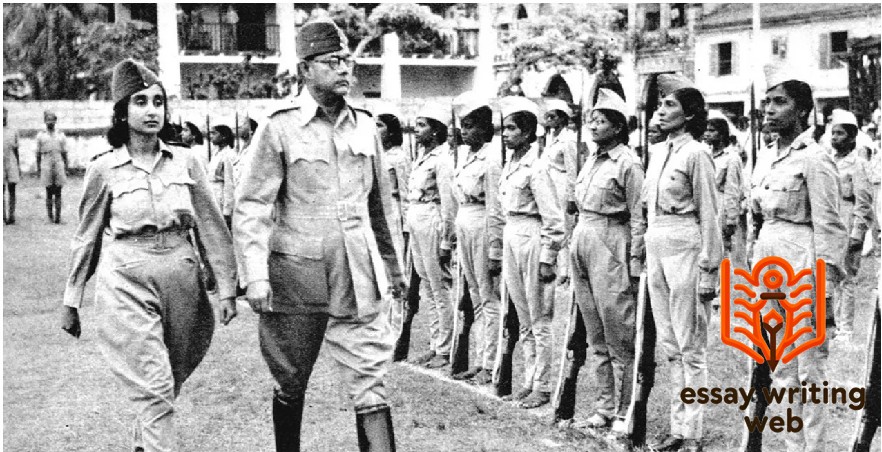
Although the Azad Hind Fauj was unable to achieve its military objectives, its impact on the Indian freedom struggle was profound. The INA’s efforts exposed the British Empire's vulnerabilities and demonstrated the widespread desire for independence among Indians. The trials of INA soldiers after the war, held by the British colonial authorities, became a focal point of nationalist sentiment. The trials sparked widespread protests and galvanized public opinion against British rule, significantly contributing to the momentum of the freedom movement.
Moreover, the legacy of the Azad Hind Fauj played a crucial role in shaping post-independence India’s national identity. Bose’s vision of a free and united India, his emphasis on secularism, and his efforts to involve all sections of society in the freedom struggle resonated deeply with the Indian populace.
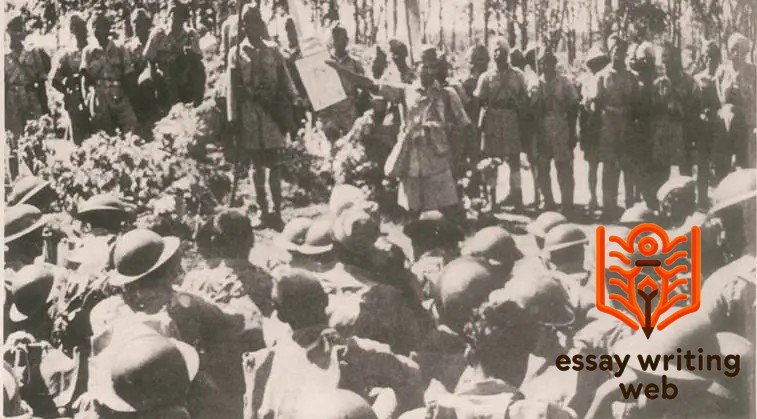
Netaji Subhash Chandra Bose, one of the most dynamic and influential leaders of India’s independence movement, is remembered not only for his role in the struggle against British colonial rule but also for his visionary ideas about the future of India. His thoughts and plans for India’s future were deeply rooted in his desire to see the nation emerge as a strong, self-reliant, and modern state. Bose’s vision was comprehensive, encompassing political, economic, and social dimensions, aimed at transforming India into a powerful and prosperous country.
Bose’s political vision for India was anchored in the idea of complete and uncompromising independence. Unlike many of his contemporaries who were willing to negotiate with the British for a gradual transfer of power, Bose demanded immediate and total freedom. He believed that India should not settle for dominion status or any form of limited autonomy but should instead strive for full sovereignty.
Bose envisioned a strong central government that could effectively govern a diverse and vast country like India. He believed that a centralized authority was essential to maintain national unity and ensure effective governance. Bose was a pragmatist who understood the challenges of nation-building in a post-colonial context, and he believed that a strong leadership was necessary to guide the country through its formative years.
While Bose admired certain aspects of authoritarianism, particularly in the context of mobilizing national resources and achieving rapid development, he was fundamentally committed to democracy. He envisioned a political system that balanced strong central authority with democratic principles, ensuring that the government remained accountable to the people.
Bose’s economic vision for India was centered on the principles of self-reliance and industrialization. He was acutely aware that political independence would be meaningless without economic independence. Bose believed that India needed to break free from the economic shackles of colonialism and build a self-sufficient economy capable of meeting the needs of its people.
He advocated for the rapid industrialization of India, recognizing that a strong industrial base was essential for national strength and prosperity. Bose envisioned the establishment of key industries, such as steel, chemicals, and manufacturing, which would not only create jobs but also reduce India’s dependence on foreign goods. He also supported the idea of state intervention in the economy, particularly in the early stages of development, to ensure that the benefits of industrialization were distributed equitably.
Bose’s emphasis on economic self-reliance extended to agriculture as well. He believed that India’s vast rural population needed to be uplifted through land reforms, modern agricultural techniques, and rural development initiatives. He was also concerned about the equitable distribution of wealth and resources, and he envisioned a society where the gap between the rich and the poor was minimized.
Netaji Subhash Chandra Bose was deeply committed to the idea of national unity and social inclusivity. Bose believed that for India to succeed as a nation, it needed to embrace its diversity while fostering a strong sense of national identity.
He was a staunch advocate of secularism and believed that religion should not play a role in politics or governance. Bose envisioned an India where people of all religions, castes, and ethnicities could live together in harmony, with equal rights and opportunities. His emphasis on secularism was reflected in the composition of the Indian National Army (INA), which was a model of unity in diversity, bringing together people from different religious and regional backgrounds to fight a common cause.
Bose was also ahead of his time in his views on gender equality. He believed that women should play an active role in nation-building and that they should have the opportunities and same rights as men. This belief was exemplified in the formation of the Rani of Jhansi Regiment, an all-women’s unit in the INA, which symbolized Bose’s commitment to empowering women.
Netaji Subhash Chandra Bose also had a clear vision of India’s role on the global stage. He believed that India, once free, should emerge as a major player in international affairs. Bose envisioned India as a leader of the oppressed nations of the world, a champion of anti-colonialism, and a proponent of peace and justice.
Bose’s vision was for India to form strong alliances with other Asian countries and to lead a pan-Asian movement against imperialism. He believed that India’s geographical position and its rich cultural heritage placed it in a unique position to play a leading role in the affairs of Asia and beyond. He also saw the importance of building a strong military to protect India’s sovereignty and to assert its influence in international matters.
